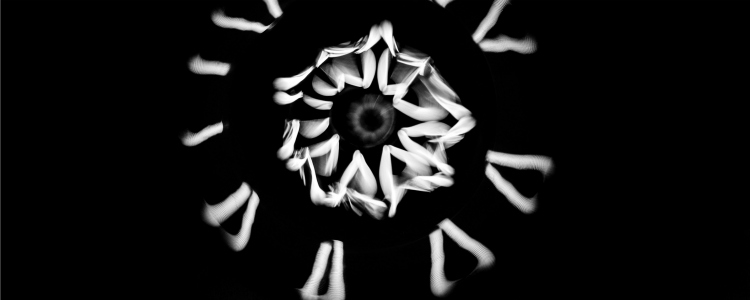Body Image and Blindness: It’s Not What I Saw, It’s What I Felt
I’ve wanted to talk about my body image struggles and my blindness in a correlating way for sometime now. Many people don’t realize that just because I can’t see well, doesn’t mean I don’t struggle with what I do see or feel. I don’t blame my blindness for my past eating disorder, but it has played a role in my body challenges.
I quietly battled an eating disorder for close to a decade. I have discussed my fight with bulimia a lot on [my] blog, my ebook, and in my Instagram posts. I am also legally blind and have been since I was a teenager, so I write about that often too. Both of these are reasons I have started to blog and write books for inspiration and awareness.
I was born with Retinitis Pigmentosa and had poor vision even before my declared blindness. I grew up knowing everything I could about my eyes. I also grew up without labeling my body. Others labeled me “thick,” but I didn’t start to look at my body and it’s shape until junior high.
I wasn’t officially declared legally blind until a year or so after I began my struggle with bulimia, but I have gotten a repeat comment and message, that sort of inspired this.
If you can’t see, how did you hate your body enough to have an eating disorder?
That question and other versions of that question, usually negative, are always popping up. People wonder that if I can’t really see what I look like, then why did I have an issue with my body. To me, that is one of the most asinine questions, but at the same time, I guess I can understand what they are getting at.
Not a Cause, But a Role
If you sat down with the therapist that I saw after my treatment, she’d probably be able to give you a laundry list of reasons or situations that led to my eating disorder. I was called names by friends and family. I was in toxic relationships. My OCD and anxiety took over, and I felt the need to find a way to have constant control. I mean, I could go on, but I’ve never discussed or brought up the role that my visual impairment has played on my body image or self-esteem.
I want to take my turn to ask a few questions, because these are the initial thoughts that run through my mind when someone asks how I could have an eating disorder if I “can’t even see.”
Do you have any idea how difficult it is to not know what you look like? To not know the exact color of your hair or eyes? To not know the shape of your body other than through touch? Do you have any idea how challenging it can be to try and look in the mirror when you know you can’t see a full reflection? Do you understand how challenging it is to constantly have to take pictures and zoom or use special aides to see yourself and others around you?
I can’t tell you what shade my eyes are right now. I can’t tell you if my old hair dye is faded or grown out yet. I can’t tell you if the sunburn that I got this weekend has turned to tan. What I can tell you is that I spent years feeling a certain way about my body. I spent years thinking I was overweight and that it wasn’t okay. I spent years chasing a body image that was never skinny enough. I can’t say that my blindness caused my bulimia, but it played a major role in how I hated myself.
Turn to the Side
In junior high and high school, I would get dressed and then turn to the side. I would try to look in the mirror at my stomach and shape. I would touch and pinch at myself. I did everything to try and see what I looked like, but I usually just gave up and went off of the numbers.
Numbers and I have had an excruciatingly long and tumultuous relationship. I can honestly say that I’m happy to not own a scale. I spent years hurting myself over arbitrary numbers. I obsessed over trying to reach my suggested BMI. I did everything I could to not go over the weight I set for myself as “too much.” I was constantly comparing my weight and pants size with every woman around me.
I could hear myself saying my weight and jeans size, but I didn’t know what that looked like the same as others who could see well. I couldn’t see myself the way I saw others, literally and figuratively.
There are still moments where I catch myself saying I want to look like that or her or so and so, and my husband will be surprised. He tries his best to explain what I look like, and I’m so grateful for him. But it’s not the same.
I can’t see it, so sometimes, it doesn’t feel real. He may think I’m beautiful, but I can’t see the whole image. It’s hard to always have to rely on descriptions rather than see it for myself. I am lucky to not have such negative thinking anymore. I still have bad moments, but most of the time, I love and accept my body.
The way that I see is best described as looking through a straw. I have a tiny field of vision and no peripheral vision left. I see a small hole with a little bit of light, some colors, and what looks like broken glass or floating hairs. At the end of that tunnel, my vision is almost always skewed. Somedays, it’s doubled. Somedays, it’s a little clearer. Somedays, my colors are bright, and other days I can’t really tell them apart at all. Somedays, I barely have any light perception.
I have good eye days and bad eye days, but even on the good days, I’m still legally blind. I’ve accepted my blindness and all of the challenges that come with it, but I couldn’t always accept my body or not seeing what it looked like. It took many years before getting to this point.
Hating a Feeling, Not an Image
I take a lot of pictures of everything. I zoom and highlight and have my methods, so I can see what it all looks like. I know my husband is handsome. I know my daughter looks like me and my son looks like my husband. I also use touch and see with my hands. My other senses have heightened, but it’s still hard to not just be able to walk into my bathroom for a quick moment and check my makeup. I have to have a process.
I have a lot of magnification tools, including a very strong magnifying mirror. It helps me do my makeup and look at details I wouldn’t be able to see otherwise, but they don’t make something like that for my body. I tried relying on pictures and the word of others growing up, but I hated what I felt. I felt fat. I felt ugly. I felt disgusting.
One of the hardest things I’ve ever gone through was getting that false image of what I felt out of my head, and some days there’s still moments of doubt. I do my best to stay positive and love myself though.
I started my body positive and body acceptance attitude once I was able to let go of the negative feelings. I might not be able to see myself in this moment, but I am beautiful. It took years to not only say that but believe it as well.
I genuinely want to share my tips and what I’ve learned to help others who struggle with body image. We might not have vision similarities, but I understand low self-esteem. I just want to help others feel inspired to love themselves, because once I found that love and happiness, my life changed for the better.
Unfortunately, I have gotten a lot of negative and rude comments about being blind and supporting a body positive message. I’ve even complimented people and their response is, “thanks but your blind.” I may be blind, but I have my abilities to know if you’re a beautiful person or not. We all adapt and find our own ways around hurdles, so don’t discredit my opinion about visual matters. Besides, comments like that show that you’re an ugly person deep down.
Not Alone
I used to feel terribly alone during the worst times of my bulimia. I was blind and had an eating disorder. I thought I was some kind of freak, but I met someone in college who changed that.
There was a girl named Angela, who I went to college with. She was also blind, and we met through the few disability panels that I spoke at. I love public speaking, and we would often be on awareness panels together. We also helped form a disability awareness group. After getting to know her a bit more, she revealed that she had suffered from anorexia in the past. I wasn’t happy that this lovely woman suffered from an eating disorder, but I was relieved that I wasn’t the only blind woman with body struggles.
The summer after my college graduation is when I sought treatment, and even though I never saw her again, she played a role in me wanting to get help. Knowing I wasn’t alone and that recovery and self-love was possible helped me during some of my darkest moments.
I credit my new found self-love to inspirational people in my life like my kids and my family, but I also wanted to get healthy and be better for me. I wanted to give myself and others like me hope. I am blind, and I wanted to be able to say “I am blind AND I am beautiful just the way I am.”
Jenni Dunlap is ablind stay-at-home mom and writer. She battled bulimia for close to a decade, and has found body confidence and self-love during her last few years of recovery. She believes that every body deserves to love themselves and feel beautiful. As a survivor and a fighter, Jenni recently published an ebook, Eat the Damn Muffin: Confidence for Every Body, detailing her journey, as well as tips to help others find self-love and body confidence.
This piece originally appeared on housewifehustle.blog and was republished with permission.





